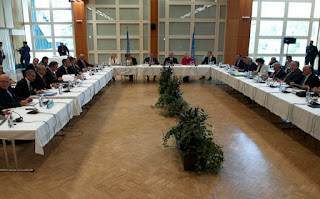The Audacity to Hope and the Audacity to Dare
Much is being written these days about the nature of the "Indignants’' that are out en masse in the main squares of Greek cities. How can such a heterogeneous movement full of contradictory demands and aspirations really be an expression of the fundamental need for political, social, and economic change? How can such a movement contribute to lifting society and the country out of its morass? One well know journalist who has been ahead of the curve by repeatedly daring to make Greek taboos known to the rest of the world, Takis Michas, wrote an interesting piece in protagon.gr titled "Where were you Indignant?". He presents an endless list of figures that show the slow decay of the country such as the fact that the consumer index was 12% than the average in the EU while the average income in Greece was 5% below the EU average and productivity was 20% below the EU average, etc.. Others question the demand and feasibility of "direct democracy" that seems to be a growing demand by the "Indignants". Yet others such as Paschos Mandravelis, a respected liberal columnist, correctly in my view, deride the methods of some of the “Indignants” including the blocking of Parliament, the throwing of stones, eggs, etc. at Ministers and any political figure that happens to be recognized…comparing these to fascism.
Like many others, I fear that the indignation and the outrage if not channeled properly and if there is no systematic attempt by the government and Parliament to clearly demonstrate the necessity and fairness of the harsh economic measures (such as the reduction of salaries and pensions as well as the fundamental restructuring of the public sector and an effective tax collection mechanisms that makes offenders pay for being free riders), the soup will hit the fan, to put it mildly.
Yet, we should all not lose sight of what the movement has done. It has undoubtedly brought about hope (at least an itsy bitsy expression of it) that the silent majority that has benefited from the system in place for some 30 years (and its siblings that cannot be accommodated by it anymore) is aware for the need for change. In part the citizens accept their mea culpa for their input in the current mess; they fundamentally understand that rebuilding means that the rights and privileges that are currently being scaled back cannot be justified under current conditions any more – I dare hope.
Apart from hope, the “Indignants” movement has allowed for a more lively exchange of views as to what needs to be done for the country to be reborn. One of the many placards held up by the outraged in Constitution writes “You have stolen our smiles”. The challenge is how to regain these on a much sounder basis.
One tract that is making inroads in the press and the internet by a group of intellectuals is titled “Dare”. It basically is a call against populist and irresponsible public rhetoric that remind us all that societies, especially healthy ones, can only be built with toil and sacrifices across generations. Negating all means negating the benefits of accession to the European Union and the adherence to western norms and values; negating all implies believing that we are a nation without brethren and deluding ourselves that we can stand alone. The system is broken; it therefore needs repair both in terms of its institutions and the human resources that comprise it and lead it. This call for change and its magnitude is not new; it has become more vocal and public over the last few years while acquiring more vociferous opposition by the systemic vested interests and many on the streets today that had been co-opted by it.
The recipes are many but they are all tough as they all necessitate a primordial rewiring of how a vibrant democratic, economically prosperous, socially inclusive society that is an EU member states operates. These include measures such as the ones Panagiotis Ioakimides, a perennial insider, presents in a recent article – separation of government and state institutions; separation between Church and State; lifting of the asylum law for universities; etc… The road ahead is difficult and painful but it risks becoming tortuous and without seeing the light at the end of the tunnel if the outrage and indignation falls victim to populism and destruction.
A few days ago, the BBC had a very interesting story about how Boris Johnson, the Mayor of London, was not among the lucky ones in getting tickets for his family for the 2012 London Olympics as his on-line application was rejected. His response was that this made him “proud to be British”, and that no other country in the world would reject the mayor of the host city's application for tickets. I can only hope this would be the case in my country as well on day. One of the rallying cries of the “Indignants” is a Mahatma Gandhi quote that “poverty is the worst form of violence”; though equating Gandhi’s struggle and his world to today’s Greece is undeniably far-fetched, poverty is and can be a rallying call to build a more egalitarian and accountable society.
The audacity to dare and hope is within our grasp…if only we can all direct all our energy there, albeit the outrage and indignation.


Comments